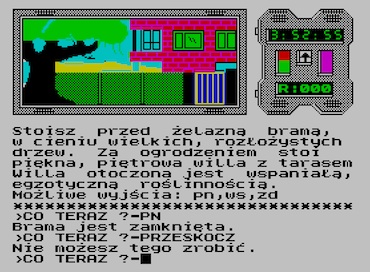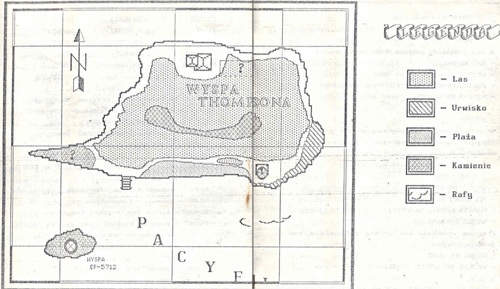Mózgprocesor (1989)
Early Polish text adventure games
 Mózgporcesor, created in 1989, published in 1990 by Computer Adventure Studio for ZX Spectrum and Atari (1991), is the most discussed and most developed of Polish text adventures. Releasing a product at the dawn of IF and the time of rapid advent of graphic adventures, Mózgprocesor's creators were well aware of audiovisual promises of personal computers. Text in the game is richly supplemented by graphics, sound and the ticking clock that tells the player when his mission need to be completed. There was an additional control on the screen: a "radiation meter" indicating the levels of radioactivity that could affect the mission's success. In game physics was rich and aiming towards naturalistic effects. In the forward to the game, designers wrote:
Mózgporcesor, created in 1989, published in 1990 by Computer Adventure Studio for ZX Spectrum and Atari (1991), is the most discussed and most developed of Polish text adventures. Releasing a product at the dawn of IF and the time of rapid advent of graphic adventures, Mózgprocesor's creators were well aware of audiovisual promises of personal computers. Text in the game is richly supplemented by graphics, sound and the ticking clock that tells the player when his mission need to be completed. There was an additional control on the screen: a "radiation meter" indicating the levels of radioactivity that could affect the mission's success. In game physics was rich and aiming towards naturalistic effects. In the forward to the game, designers wrote:
The story is quite similar to Puszka Pandory, set on an island where player's character, also an agent, is on the mission to find the brain processor that can rescue a genius academic Brian Thompson. Professor, creator of a biological computer, is already in a coma and undergoing a surgery. If a player fails to deliver the brain processor in 4 hours, the game is lost. Players were able to save the game.
Around 40 commands were accepted (plus directional commands and several system instructions) with different word variations. Developers encouraged players to combine commands in larger sentences, for example: POBIEGNIJ SZYBKO W KIERUNKU ZACHODNIM (eng. RUN FAST TO THE WEST). The underlying rules of parser behavior and dictionary processing were similar to the ones seen in Smok Wawelski and - according to Fedoryński – were not representing significant changes or improvements. For the first time in an emerging industry the game was professionally published and distributed. The packaging included user's manual and a map of the game-world.
Critical response was highly positive. Mozgprocesor was compared to Police Quest in terms of refinement. "Graphics and sound are a delight", wrote a reviewer from “Bajtek” (1989). The main concern had been about the gameplay being to short and too fast to complete.
Unfortunately, Computer Adventure Studio's first big title, despite its huge popularity in Poland, was the last one. Mozgprocesor was pirated en masse, and brought virtually no profits and undermined the young company’s existence.
Mariusz Pisarski
- Techsty- archiwum
- Techsty issue 1
- Techsty issue 2
- Techsty issue 3
- Techsty issue 4
- Techsty issue 5
- o Techstach
- wizytówka
- about Techsty
- in English
